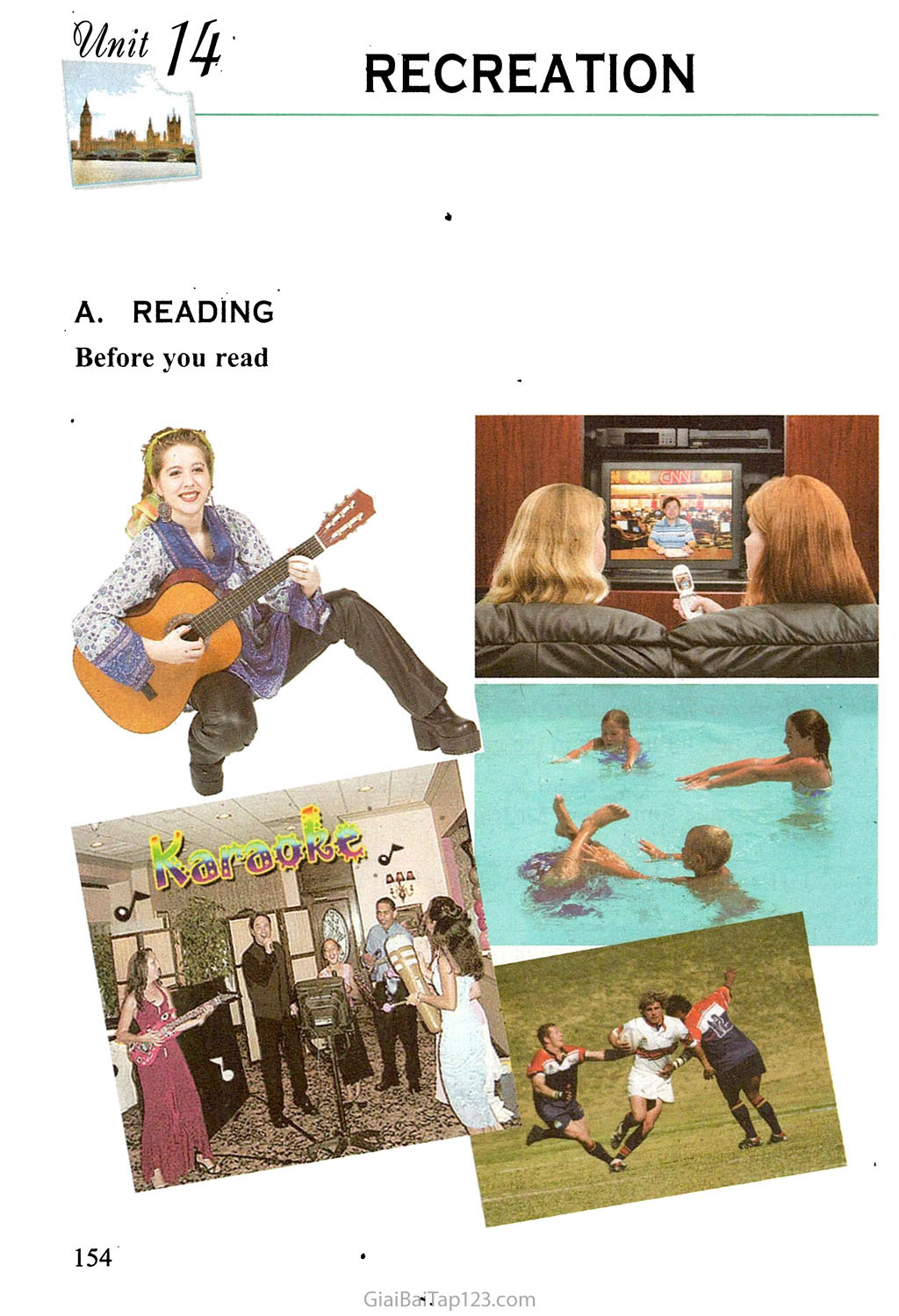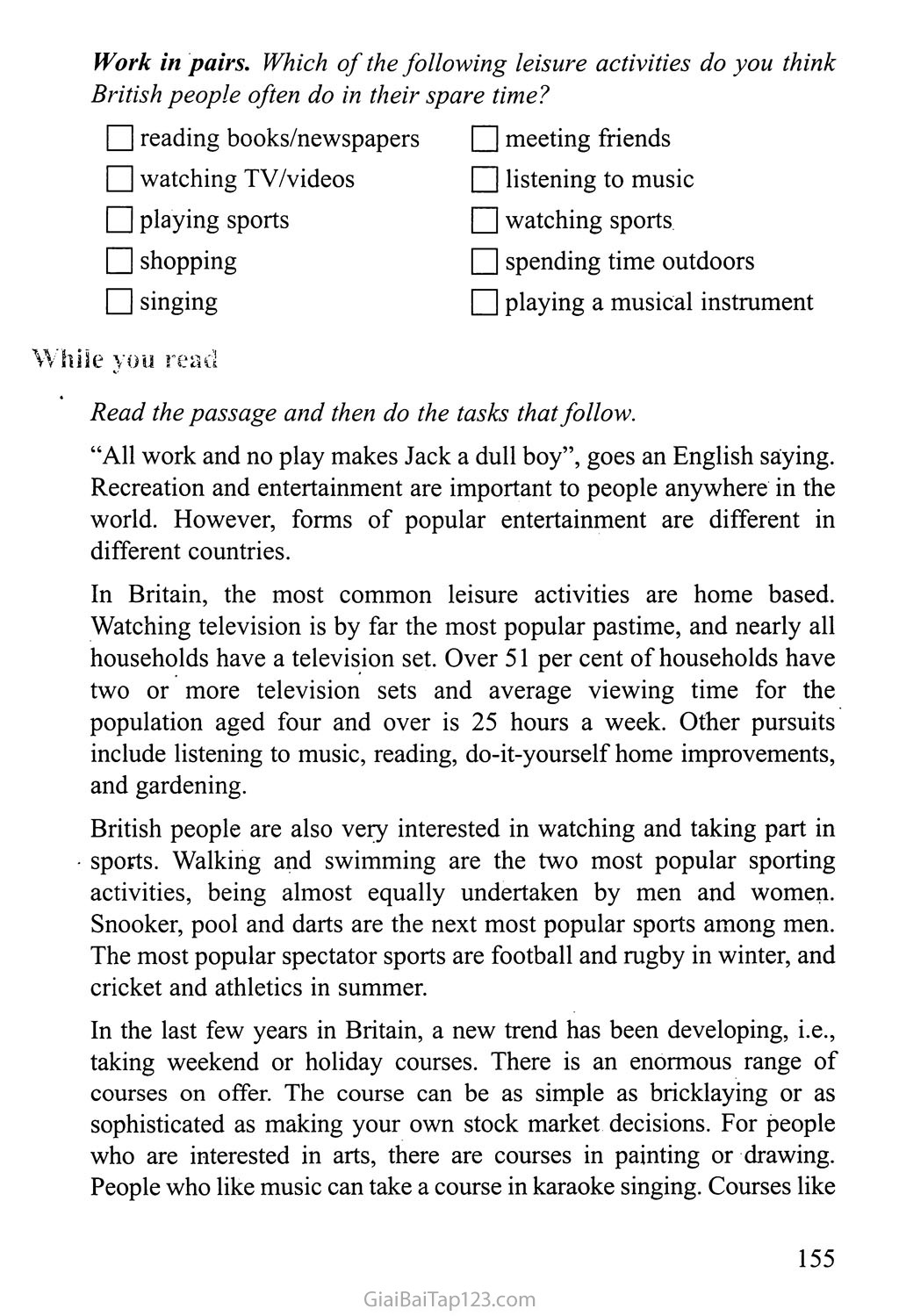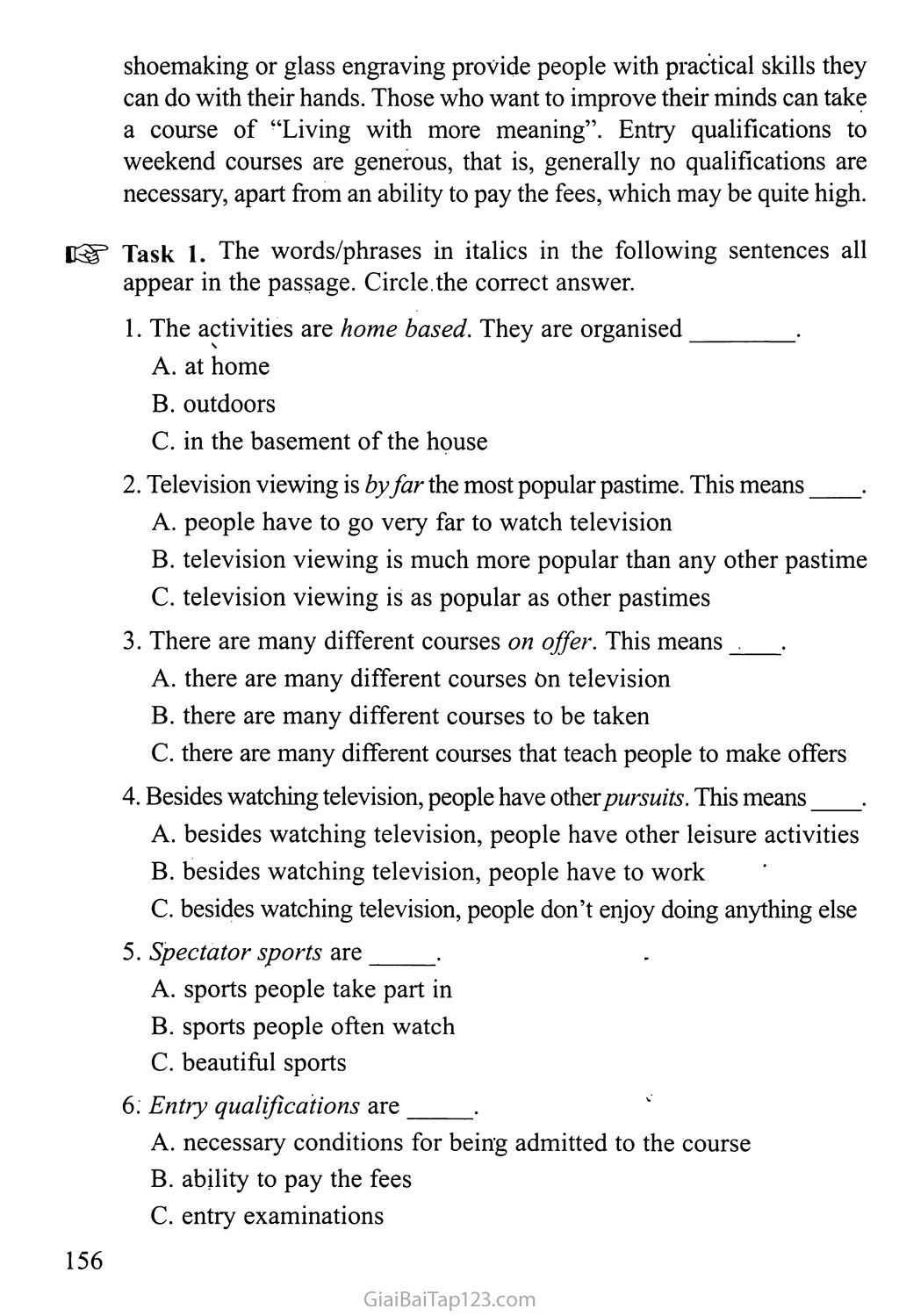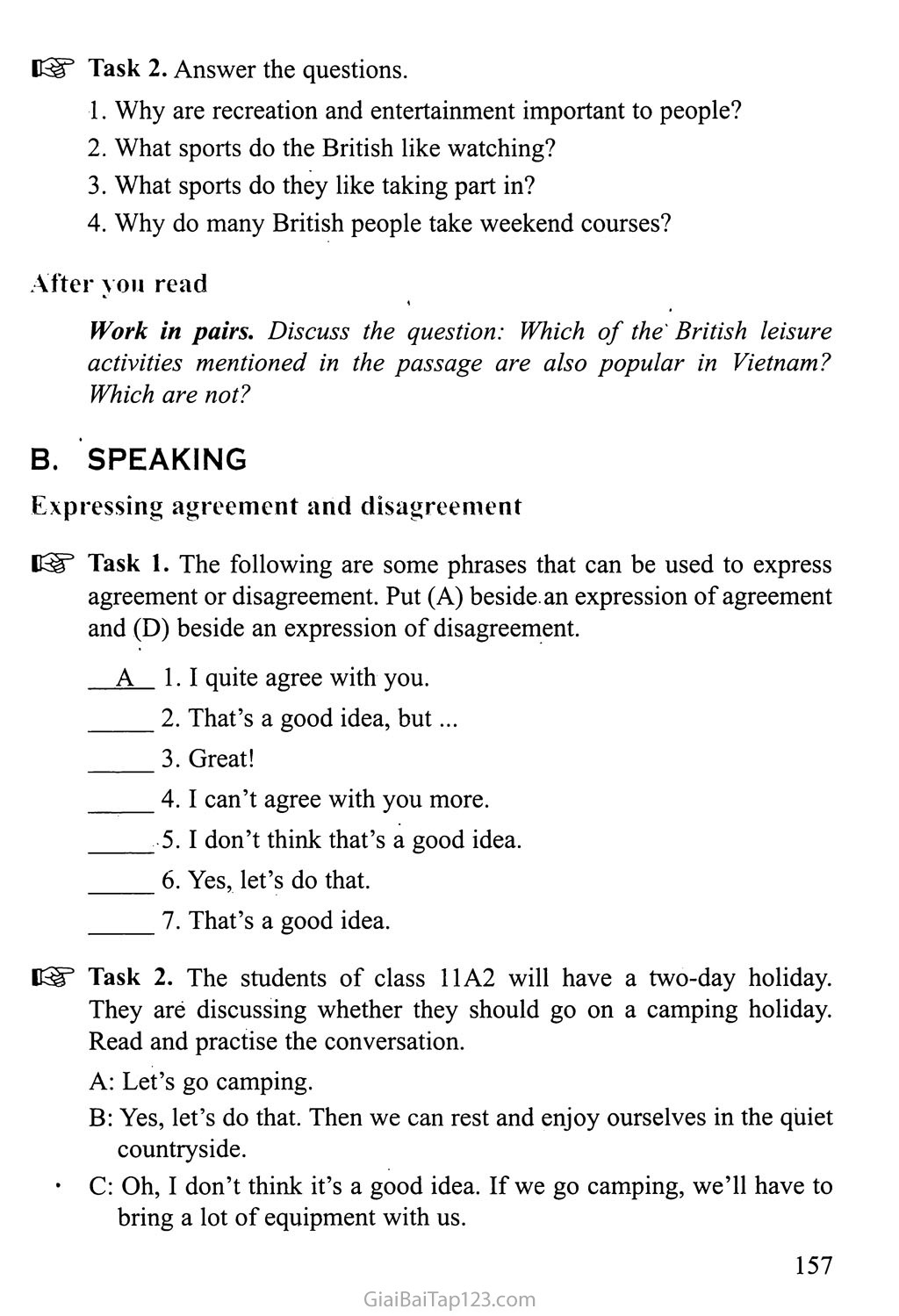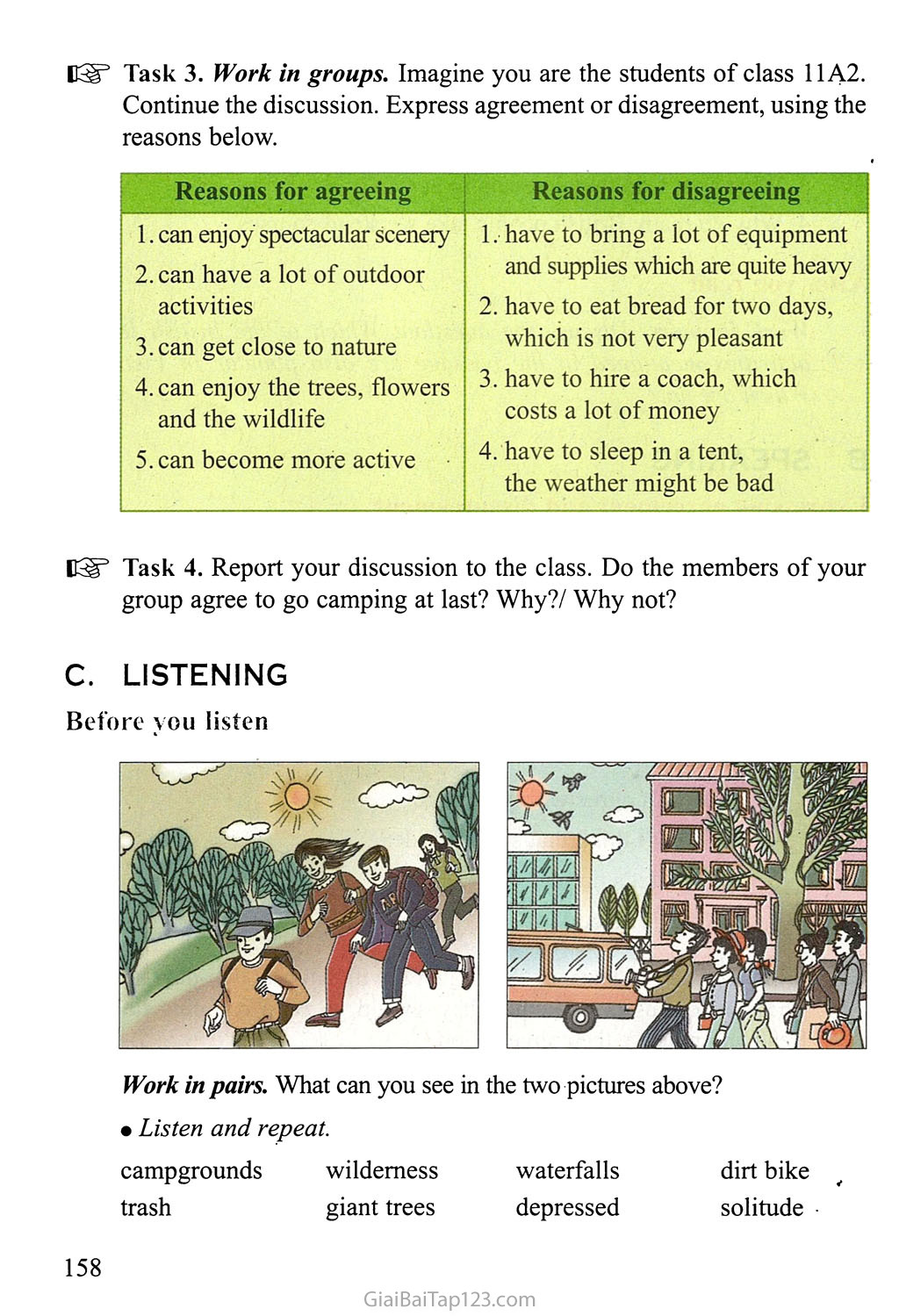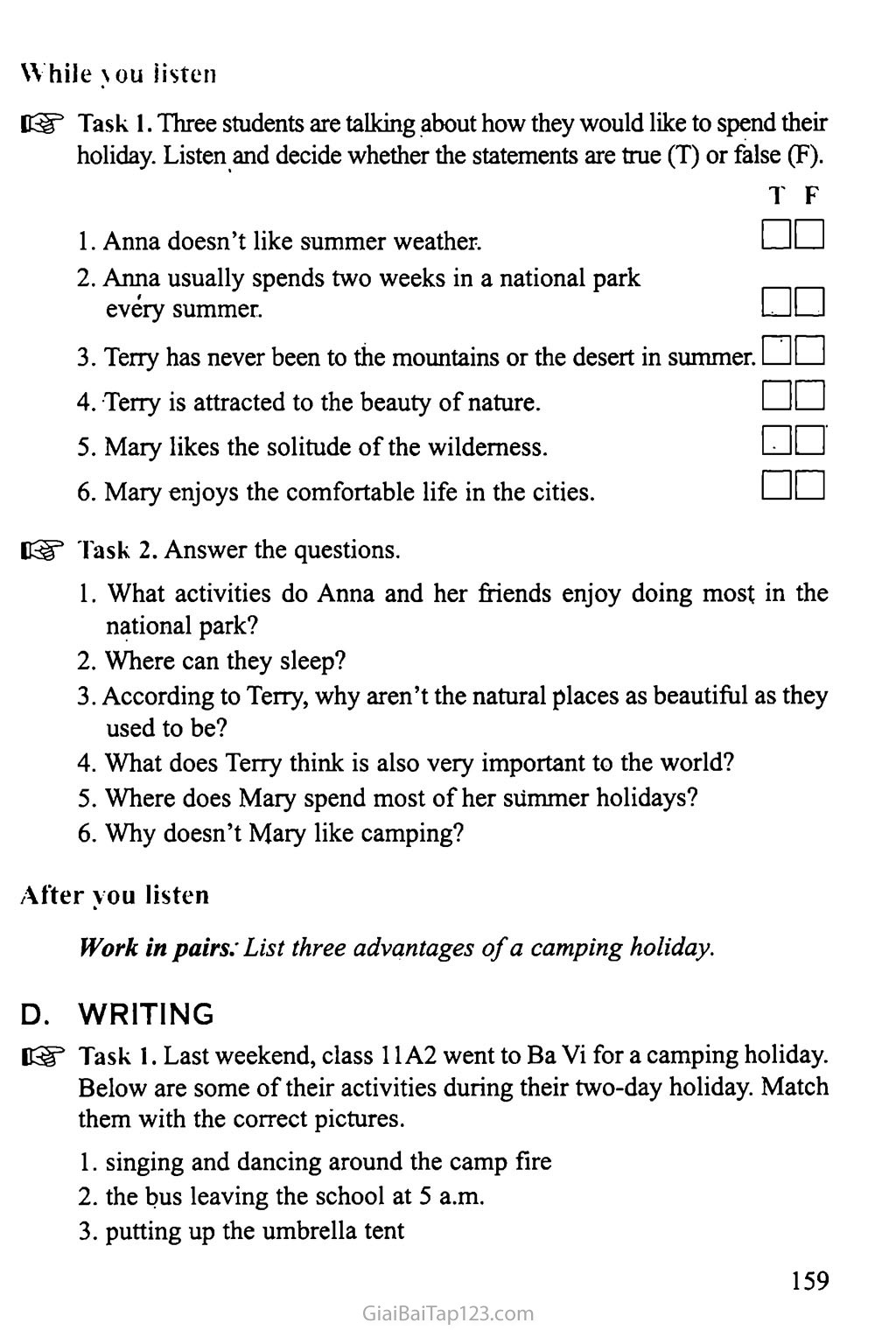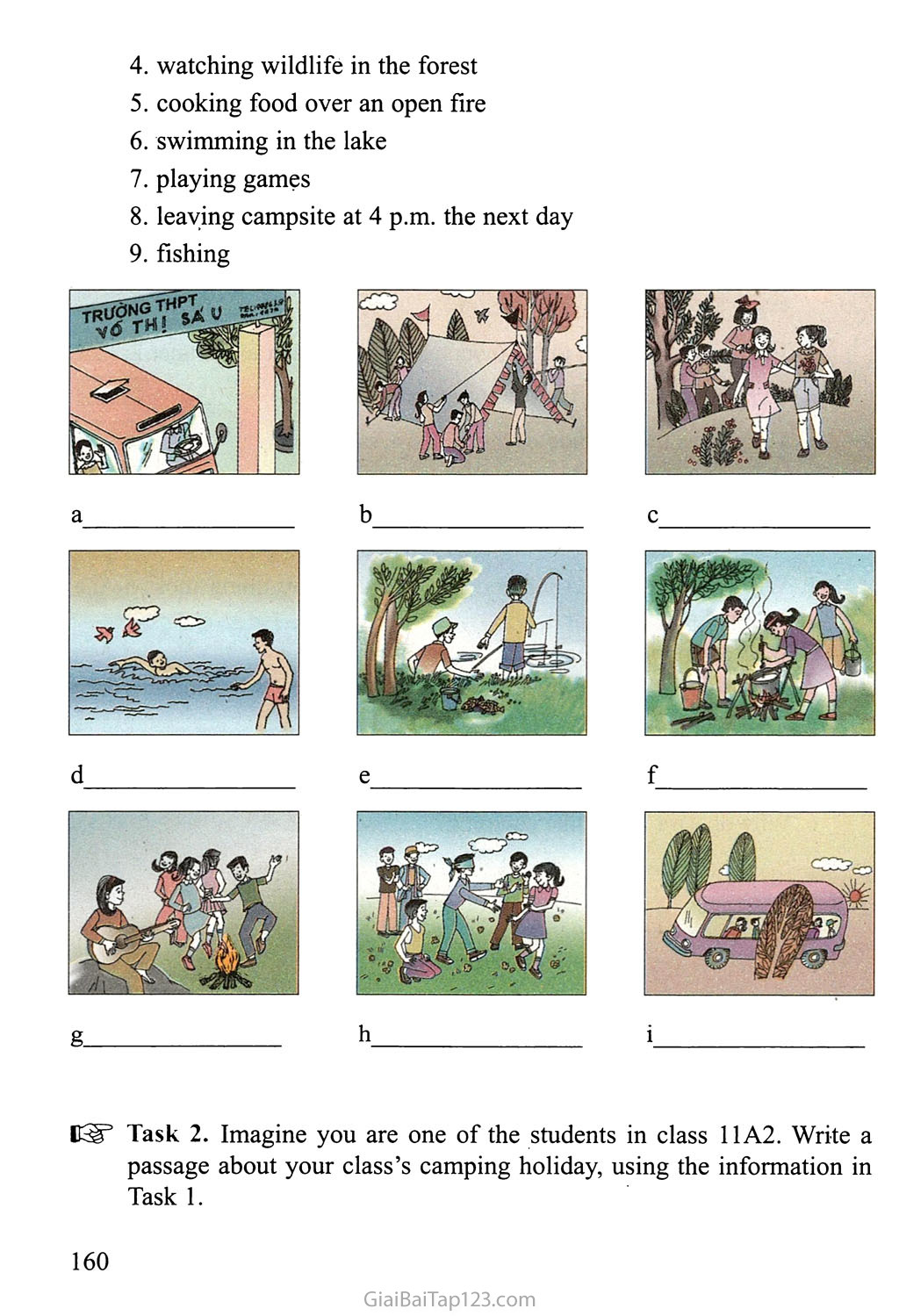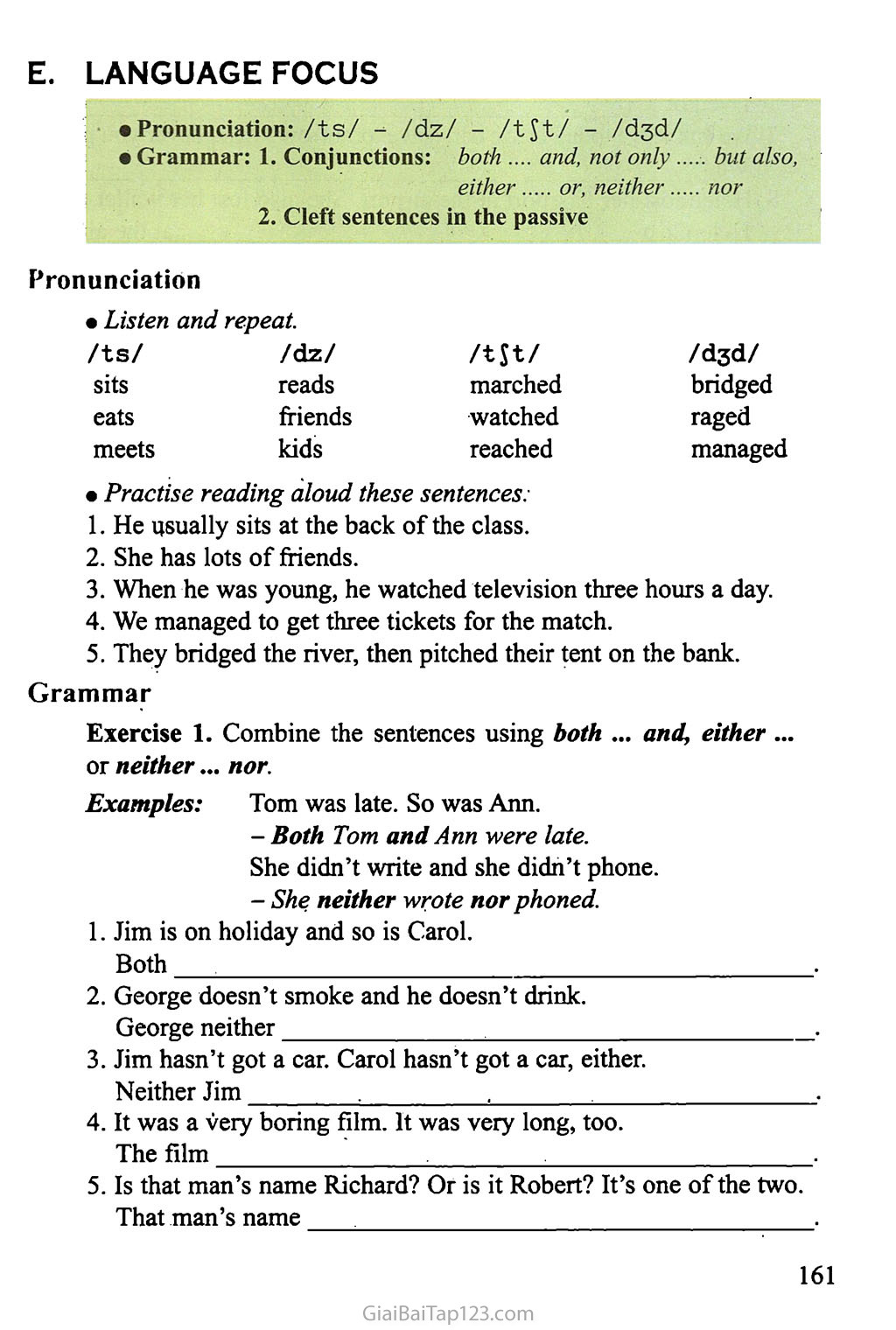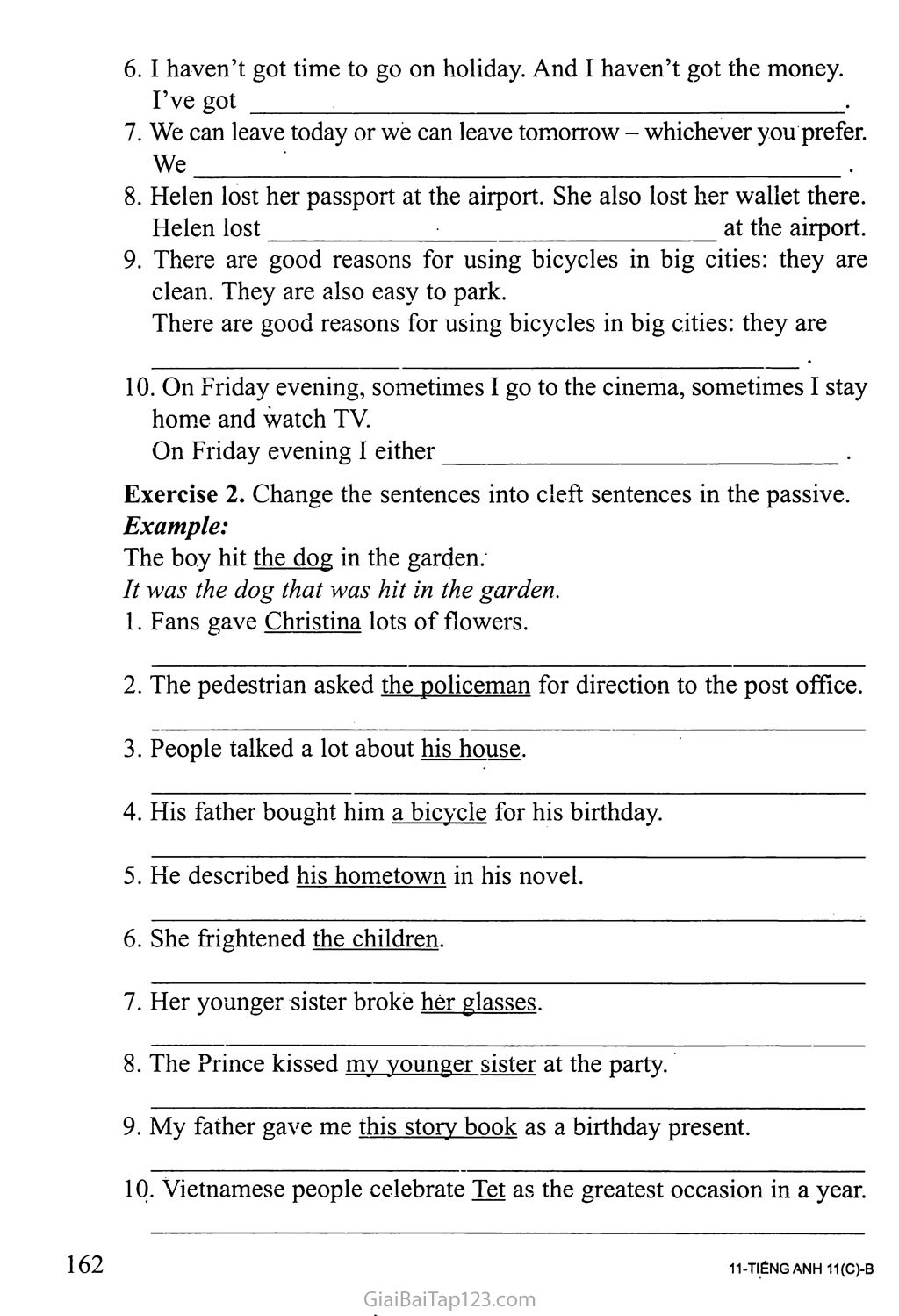SGK Tiếng Anh 11 - Unit 14: RECREATION
recreation A. READING Before you read Work in pairs. Which of the following leisure activities do you think British people often do in their spare time? I I reading books/newspapers I I meeting friends I I watching TV/videos I I playing sports shopping singing 21 listening to music □ watching sports I I spending time outdoors 21 playing a musical instrument While you read Read the passage and then do the tasks that follow. “All work and no play makes Jack a dull boy”, goes an English saying. Recreation and entertainment are important to people anywhere in the world. However, forms of popular entertainment are different in different countries. In Britain, the most common leisure activities are home based. Watching television is by far the most popular pastime, and nearly all households have a television set. Over 51 per cent of households have two or more television sets and average viewing time for the population aged four and over is 25 hours a week. Other pursuits include listening to music, reading, do-it-yourself home improvements, and gardening. British people are also very interested in watching and taking part in sports. Walking and swimming are the two most popular sporting activities, being almost equally undertaken by men and women. Snooker, pool and darts are the next most popular sports among men. The most popular spectator sports are football and rugby in winter, and cricket and athletics in summer. In the last few years in Britain, a new trend has been developing, i.e., taking weekend or holiday courses. There is an enormous range of courses on offer. The course can be as simple as bricklaying or as sophisticated as making your own stock market decisions. For people who are interested in arts, there are courses in painting or drawing. People who like music can take a course in karaoke singing. Courses like shoemaking or glass engraving provide people with practical skills they can do with their hands. Those who want to improve their minds can take a course of “Living with more meaning”. Entry qualifications to weekend courses are generous, that is, generally no qualifications are necessary, apart from an ability to pay the fees, which may be quite high. KẵT Task 1. The words/phrases in italics in the following sentences all appear in the passage. Circle.the correct answer. necessary conditions for being admitted to the course ability to pay the fees c. entry examinations IỔểT Task 2. Answer the questions. Why are recreation and entertainment important to people? What sports do the British like watching? What sports do they like taking part in? Why do many British people take weekend courses? After you read ♦ / Work in pairs. Discuss the question: Which of the' British leisure activities mentioned in the passage are also popular in Vietnam? Which are not? B. SPEAKING Expressing agreement arid disagreement Task 1. The following are some phrases that can be used to express agreement or disagreement. Put (A) beside an expression of agreement and (D) beside an expression of disagreement. A 1. I quite agree with you. 2. That’s a good idea, but... 3. Great! 4. I can’t agree with you more. 5. I don’t think that’s a good idea. 6. Yes, let’s do that. 7. That’s a good idea. O3 Task 2. The students of class 11A2 will have a two-day holiday. They are discussing whether they should go on a camping holiday. Read and practise the conversation. A: Let’s go camping. B: Yes, let’s do that. Then we can rest and enjoy ourselves in the quiet countryside. ’ C: Oh, I don’t think it’s a good idea. If we go camping, we’ll have to bring a lot of equipment with US. df5 Task 3. Work in groups. Imagine you are the students of class 11Ạ2. Continue the discussion. Express agreement or disagreement, using the reasons below. Reasons for agreeing Reasons for disagreeing can enjoy spectacular scenery can have a lot of outdoor activities can get close to nature can enjoy the trees, flowers and the wildlife can become more active have to bring a lot of equipment and supplies which are quite heavy have to eat bread for two days, which is not very pleasant have to hire a coach, which costs a lot of money have to sleep in a tent, the weather might be bad dr Task 4. Report your discussion to the class. Do the members of your group agree to go camping at last? Why?/ Why not? c. LISTENING Before you listen Work in pairs. What can you see in the two pictures above? • Listen and repeat. campgrounds wilderness waterfalls dirt bike trash giant trees depressed solitude ■ While you listen EdgT Task Three students are talking about how they would like to spend their holiday. Listen and decide whether the statements are true (T) or false (F). T F Anna doesn’t like summer weather. L_JI I Anna usually spends two weeks in a national park every summer. I II I Terry has never been to the mountains or the desert in summer. I II I Terry is attracted to the beauty of nature. I II I Mary likes the solitude of the wilderness. I II I Mary enjoys the comfortable life in the cities. I II I KW Task 2. Answer the questions. What activities do Anna and her friends enjoy doing most in the national park? Where can they sleep? According to Terry, why aren’t the natural places as beautiful as they used to be? What does Terry think is also very important to the world? Where does Mary spend most of her summer holidays? Why doesn’t Mary like camping? After you listen Work in pairs. List three advantages of a camping holiday. D. WRITING • FSir Task 1. Last weekend, class 11A2 went to Ba Vi for a camping holiday. Below are some of their activities during their two-day holiday. Match them with the correct pictures. singing and dancing around the camp fire the bus leaving the school at 5 a.m. putting up the umbrella tent watching wildlife in the forest cooking food over an open fire swimming in the lake playing games leaving campsite at 4 p.m. the next day fishing b d e f g h i KẫT Task 2. Imagine you are one of the students in class 11A2. Write a passage about your class’s camping holiday, using the information in Task 1. E. LANGUAGE FOCUS Pronunciation: /ts/ - /dz/ - /t^t/ - /d3d/ Grammar: 1. Conjunctions: both .... and, not only ..... but also, either or, neither nor Cleft sentences in the passive ciatiôn • Listen and repeat. /ts/ /dz/ /t$t/ /d3d/ sits reads marched bridged eats friends watched raged meets kids ' reached managed • Practise reading aloud these sentences: • He usually sits at the back of the class. She has lots of friends. When he was young, he watched television three hours a day. We managed to get three tickets for the match. They bridged the river, then pitched their tent on the bank. Exercise 1. Combine the sentences using both ... and, either ... or, or neither... nor. Examples: Tom was late. So was Ann. Both Tom and Ann were late. She didn’t write and she didn’t phone. She neither wrote nor phoned. Jim is on holiday and so is Carol. Both . George doesn’t smoke and he doesn’t drink. George neither _. Jim hasn’t got a car. Carol hasn’t got a car, either. Neither Jim . . It was a very boring film. It was very long, too. The film ___. Is that man’s name Richard? Or is it Robert? It’s one of the two. That man’s name - . I haven’t got time to go on holiday. And Ỉ haven’t got the money. I’ve got . We can leave today or we can leave tomorrow - whichever you prefer. We . Helen lost her passport at the airport. She also lost her wallet there. Helen lost at the airport. There are good reasons for using bicycles in big cities: they are clean. They are also easy to park. There are good reasons for using bicycles in big cities: they are On Friday evening, sometimes I go to the cinema, sometimes I stay home and watch TV. On Friday evening I either . Exercise 2. Change the sentences into cleft sentences in the passive. Example: The boy hit the dog in the garden. It was the dog that was hit in the garden. Fans gave Christina lots of flowers. The pedestrian asked the policeman for direction to the post office. People talked a lot about his house. His father bought him a bicycle for his birthday. He described his hometown in his novel. She frightened the children. Her younger sister broke her glasses. The Prince kissed my younger sister at the party. My father gave me this story book as a birthday present. Vietnamese people celebrate Tet as the greatest occasion in a year.

